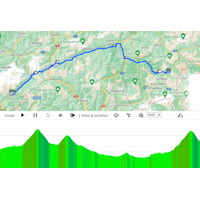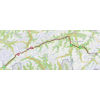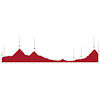Tour de Suisse 2023 Route stage 5: Fiesch - La Punt
 Thursday 15 June - The 5th stage of the Tour de Suisse is a long and mountainous test. The race adds up to 211 kilometres, while taking in an elevation gain of 4,711 metres. The last 9.5 kilometres fly down the Albula Pass for a finish in La Punt.
Thursday 15 June - The 5th stage of the Tour de Suisse is a long and mountainous test. The race adds up to 211 kilometres, while taking in an elevation gain of 4,711 metres. The last 9.5 kilometres fly down the Albula Pass for a finish in La Punt.
The riders hit the Furka Pass after 23 kilometres. It’s a 16.5 kilometres climb at 6.4% to an elevation of 2,433 metres above sea level. The Furka is the highest point of the Tour de Suisse.
The riders fly down into Andermatt and tackle the Oberalppass straight away. The second climb of the day is 10.7 kilometres long and averages 5.5%.
A descent of roughly 50 kilometres precedes the ascent up the Abula Pass. The first 7 kilometres are, at over 8%, the steepest. The route continues to climb for another 10.4 kilometres, while the average gradient of the entire climb sits at 6.8%.
There are still 9.5 kilometres left on the summit. Which is all on descent.
Rui Costa outsprinted Bauke Mollema and Tejay van Garderen ten years ago in La Punt, while Domenico Pozzovivo soloed to victory in 2017.
A descent of roughly 50 kilometres precedes the ascent up the Abula Pass. The first 7 kilometres are, at over 8%, the steepest. The route continues to climb for another 10.4 kilometres, while the average gradient of the entire climb sits at 6.8%.
There are still 9.5 kilometres left to race at the summit. Which is all on descent.
Rui Costa outsprinted Bauke Mollema and Tejay van Garderen ten years ago in La Punt, while Domenico Pozzovivo soloed to victory in 2017.
Starting at kilometer 195.2 – or, 6 kilometres before the summit of the Abula Pass -, the Golden Kilometre serves two opportunities to gain time bonuses of 3, 2 and 1 seconds. The first three riders on the line take 10, 6 and 4 seconds.
Ride the route yourself? Download GPX stage 5 2023 Tour de Suisse.
Another interesting read: results 5th stage 2023 Tour de Suisse.
Tour de Suisse 2023 stage 5: route, profile, more
Click on the images to zoom
Watch the highlights of recent races here:
Related articles GC Favourites - Tour de Suisse 2023 Overview - Tour de Suisse 2023 Ayuso wins thriller ITT, Skjelmose takes GC triumph - Tour de Suisse 2023 Stage 8: Start times ITT - Tour de Suisse 2023 Evenepoel honours Mäder with solo victory - Tour de Suisse 2023 Stage 6 cancelled after Gino Mäder's passing - Tour de Suisse 2023 Gall solos to victory and race lead - Tour de Suisse 2023 Stage win and leader's jersey for Skjelmose - Tour de Suisse 2023 Sprint triumph Girmay, Küng still leader - Tour de Suisse 2023 Route stage 1: Einsiedeln - Einsiedeln - Tour de Suisse 2023 Route stage 2: Beromünster - Nottwil - Tour de Suisse 2023 Route stage 3: Tafers - Villars-sur-Ollon - Tour de Suisse 2023 Route stage 4: Monthey - Leukerbad - Tour de Suisse 2023 Route stage 6: Chur - Oberwil-Lieli - Tour de Suisse 2023 Route stage 7: Tübach - Weinfelden - Tour de Suisse 2023 Route stage 8: Sankt Gallen - Abtwil - Tour de Suisse 2023 Küng takes first leader's jersey with ITT win - Tour de Suisse 2023 More articles Summer Olympics 2024 Paris: Route ITT (m/w)
Summer Olympics 2024 Paris: Start list + times ITT – men
Summer Olympics 2024 Paris: Start list + times ITT – women
Summer Olympics 2024 Paris: Route road race – men
Summer Olympics 2024 Paris: Riders road race – men
Summer Olympics 2024 Paris: Route road race – women
Summer Olympics 2024 Paris: Riders road race – women
Clásica de San Sebastián 2024: The Route
Tour de France Femmes 2024: The Route
Tour de France Femmes 2024 Route stage 1: Rotterdam - The Hague
Tour de France Femmes 2024 Route stage 2: Dordrecht - Rotterdam
Tour de France Femmes 2024 Route stage 3: Rotterdam ITT
Tour de France Femmes 2024 Route stage 4: Valkenburg - Liège
Tour de France Femmes 2024 Route stage 5: Bastogne - Amnéville
Tour de France Femmes 2024 Route stage 6: Remiremont - Morteau
Tour de France Femmes 2024 Route stage 7: Champagnole - Grand-Bornand
Tour de France Femmes 2024 Route stage 8: Grand-Bornand - Alpe d'Huez
Vuelta 2024: The Route
Vuelta 2024: Riders
Vuelta 2024 Route stage 1: Lisbon - Oeiras
Vuelta 2024 Route stage 2: Cascais - Ourém
Vuelta 2024 Route stage 3: Lousã - Castelo Branco
Vuelta 2024 Route stage 4: Plasencia - Pico Pitolero
Vuelta 2024 Route stage 5: Fuente del Maestre - Seville
Vuelta 2024 Route stage 6: Jerez de la Frontera - Yunquera
Vuelta 2024 Route stage 7: Archidona – Córdoba
Cycling Calendar 2024
Tour de France 2024: Withdrawals
Like our Facebook page and stay on top of all pro-race information!




